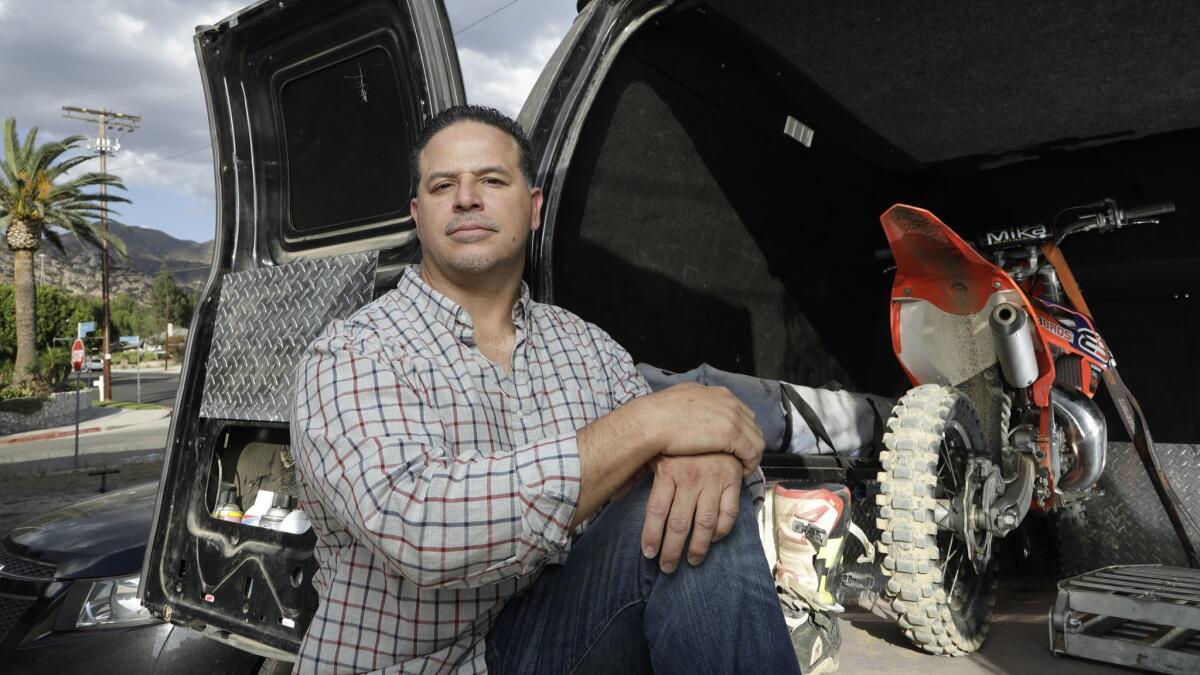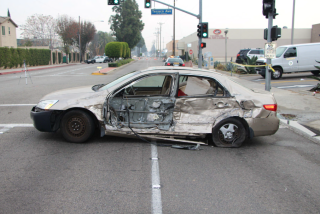Latino motorists describe anger at being stopped on 5 Freeway by sheriff’s unit seeking drugs

- Share via
Roni Salguero Casasola had heard from friends in Bakersfield that L.A. County sheriff’s deputies were pulling over Latino motorists on the 5 Freeway heading into Los Angeles. But even those warnings hadn’t prepared him for what happened next.
As he and a friend drove toward a Glendale car dealership, Salguero said, a sheriff’s deputy pulled them over on the 5 Freeway and asked if they were carrying drugs. The deputy, he said, handcuffed them, placed them in the back seat of a sheriff’s SUV and thoroughly searched their vehicle before releasing them after finding nothing.
Returning home the same day, Salguero was driving a different car he had just purchased when a cop signaled for him to pull over on the 5 Freeway.
It was the same sheriff’s deputy.
Salguero is one of several motorists who say they believe they were the victims of racial profiling by a sheriff’s highway enforcement team that has stopped thousands of innocent Latino drivers over the last six years along a 40-mile stretch of the 5 Freeway.
A Times analysis of more than 9,000 stops found that 69% of drivers stopped by the Domestic Highway Enforcement Team from 2012 through the end of last year were Latino and that two-thirds of them had their vehicles searched — a rate far higher than motorists of other racial and ethnic groups.
“It could have been [a white driver] in the right lane, a Latino in the middle and another white guy on the left, and they’d stop the Latino,” Salguero, 48, said of the sheriff’s team. “That’s racism.”
Sheriff’s officials have denied racial profiling and insisted the deputies base their stops only on a person’s driving and other impartial factors.
Sheriff Jim McDonnell, who has declined interview requests with The Times before and after the newspaper published its findings this month, said in a radio interview last week that his department would work with the county’s inspector general, which started investigating the team’s work in response to the story.
“We don’t tolerate racial profiling in our organization,” McDonnell told KPCC. “We talk about how critical it is for us to be objective, for us to be viewed as an impartial party by everybody that we serve. Credibility is our currency and if we lose that in any way we are not able to protect the public.”
Sheriff’s officials said the team was launched in response to a spate of drug overdoses in the Santa Clarita area. Now comprising four deputies, the team traverses a stretch of the 5 Freeway that spans from the border with Kern County to just south of Santa Clarita.
Though the deputies are looking for any criminality, nearly all of the team’s arrests are for drug-related crimes. The 5 Freeway, they say, is a pipeline for cartels to move drugs up the West Coast and return to Mexico with cash from drug sales as well as weapons purchased in the United States.
The team’s work has resulted in a haul that includes more than a ton of methamphetamine, 2 tons of marijuana, 600 pounds of cocaine and millions of dollars in suspected drug money.
But Thomas A. Saenz, president and general counsel of the Mexican American Legal Defense and Educational Fund, said such success comes at a price if deputies are targeting Latino drivers.
“People lose trust in the Sheriff’s Department and they lose trust in law enforcement more broadly,” he said. “That’s all triggered by the injustice of feeling targeted because of your race.”
‘Not a threat’
Marcelino Garcia recalls immediately growing tense when he noticed the sheriff’s vehicle following behind.
The high school teacher checked his speed to ensure he was driving legally as he took his 11-year-old son home to Sylmar after the boy’s motocross practice near Gorman.
The deputy followed on the 5 Freeway for about 10 minutes before pulling up alongside his Ford van and making eye contact, Garcia said. The deputy then dropped back and flashed his lights for him to pull over.
After checking Garcia’s license and registration, the deputy still had questions: Where are you going? Do you have any drugs in vehicle or large amounts of cash?
Garcia said he replied that he did not and questioned why he was stopped. The deputy said it was because his van had illegally tinted windows, and wrote Garcia a ticket. The traffic stop lasted about 15 minutes, Garcia said.
“It did feel like harassment,” Garcia said. “The deputy sees my papers are all good and sees my son. It’s clear that I’m not a threat. What about the fact that I’m a human? I get their job is to find drugs, but the means don’t justify the outcome.”
Garcia, 43, provided The Times with a copy of his citation from his June 14 stop identifying Deputy Adam Halloran as making the stop.
Halloran declined to comment.
Garcia said he was so upset by the encounter that he immediately drove to the Santa Clarita sheriff’s station to complain to a supervisor. His complaint was brushed off, Garcia said.
“My son is sitting there with his motocross gear and helmet as this is going on. He was terrified out of his mind,” Garcia said. “Later he asked me, ‘Why did he pull us over?’ I didn’t have an answer for him. I don’t want my son to have a negative view of law enforcement.”
‘Nothing suspicious’
Edwin Diaz vividly remembers the day in August 2013 he was stopped by an L.A. sheriff’s deputy.
He and his wife, Kenia Mancia, were driving home to Los Angeles after a trip to Yosemite National Park when a deputy pulled over their black Honda Civic for speeding. Diaz said the deputy asked where they were coming from and whether they had weapons or drugs before asking them to step out of the car.
Diaz said he told the deputy that his wife, who had arrived from their native El Salvador three months earlier, didn’t speak English. But the deputy continued to ask her questions in English.
Mancia said he asked whether she had a large amount of cash. She said she didn’t understand the question but responded with a “yes.”
The deputy removed everything from the car and called for a drug-sniffing dog. The search turned up several hundred dollars left over from their trip before the deputy allowed them to leave.
Though two-thirds of Latino drivers who were pulled over had their vehicles searched, cars belonging to all other drivers were searched less than half the time, according to the analysis of sheriff’s stop data. Deputies found drugs or other illegal items in the vehicles of Latino motorists at a rate that was not significantly higher than that of black or white drivers, The Times’ analysis found.
Diaz, 35, said the deputy remained respectful during the encounter but that he remains bewildered by why he and his wife would be targeted by a team looking for drug traffickers.
“It was a normal car — nothing suspicious,” Diaz said. “All my documents were in order. It was just a car driven by a Latino person.”
Stopped twice
Salguero said he remains angry years after the day he was pulled over twice.
The construction worker said he recalls the deputy asking him during the first stop, “Where are the drugs?”
He replied that he didn’t have any. Several patrol cars quickly arrived and a drug-sniffing dog checked Salguero and his friend, he said.
The deputy handcuffed them and led them to the back of his patrol car while he searched Salguero’s Honda Accord, looking under the hood and behind the interior door panels. The stop lasted about 15 minutes, Salguero said.
Returning home later, Salguero was driving a used Toyota Camry he had just purchased when the same deputy pulled him over.
He said the deputy asked the same question he had earlier in the day: “Where are the drugs?”
“You stopped me this morning,” Salguero recalled replying. “Do you remember? This is the car I went to buy.”
Salguero showed him the title and registration, and the deputy said he remembered him.
Sheriff’s data show that the team stopped and searched Salguero’s vehicle while he was heading southbound on the freeway about 10:30 a.m. on Sept. 11, 2013. About 1 p.m., a man with the same date of birth was stopped by the same deputy, Ethan Marquez, heading northbound near the same Lake Hughes Road exit.
Marquez declined to comment.
According to the data, a consensual search of the vehicle was conducted during the first stop and no search was performed during the second.
Salguero said that the deputy didn’t ask for consent to search the vehicle and that he was placed in handcuffs during the second stop while the deputy quickly inspected the newly purchased Camry.
The experience still rankles.
“If you even looked Hispanic, you’d get stopped,” Salguero said. “That really bothers me.”
More to Read
Sign up for Essential California
The most important California stories and recommendations in your inbox every morning.
You may occasionally receive promotional content from the Los Angeles Times.













